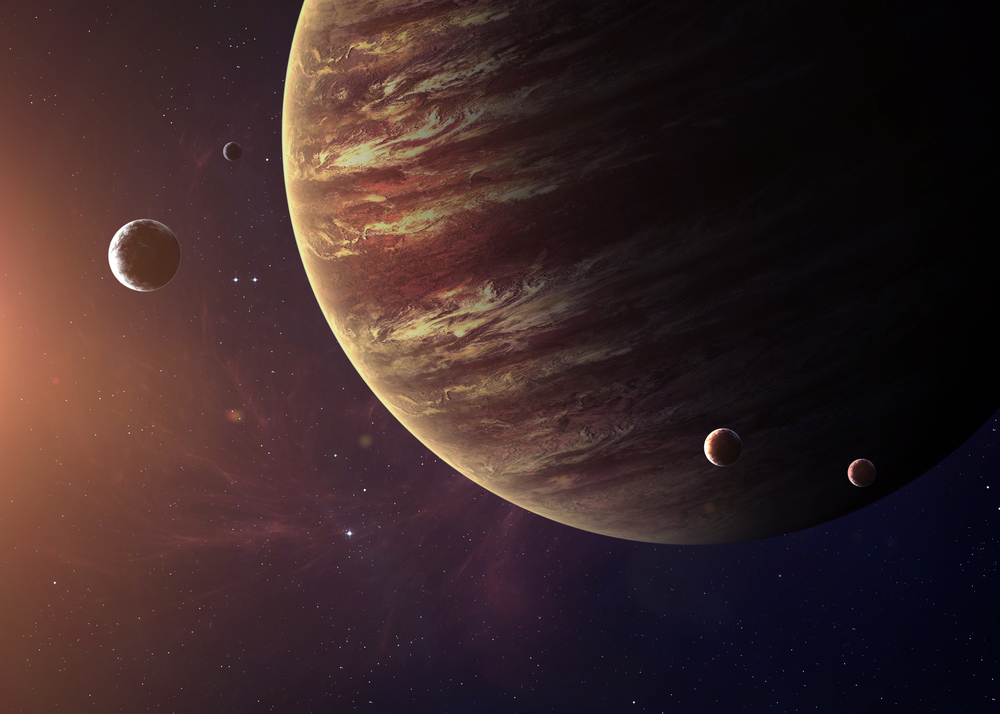
Ancient astronomers observed and tracked five planets in our skies: Mercury, Venus, Mars, Jupiter, and Saturn. Called “wandering stars” by the Greeks, their movements were recorded extensively. This data was used for timekeeping, divination, and even constructing buildings and cities. With both formidable mythological and celestial impacts, Jupiter occupies significant places in both astronomy and astrology.
Ancient and Modern Observations
As National Geographic explains, Jupiter is a planet of extremes. Inside its huge mass, it can fit more than 1,300 Earth-sized objects. An average Jovian day lasts only 10 hours while it takes an astonishing 12 years to orbit our sun. Wind speeds can reach up to 335 miles per hour, while crushing pressure below its gaseous upper atmosphere turns hydrogen into liquid. This gas giant is famous for its Great Red Spot, an enormous anticyclone for which NASA scientists estimate wind speeds of up to 400 miles per hour.
Italian astronomer Galileo Galilei saw Jupiter through his telescope in the early 1600s. As Encyclopedia Britannica reveals, Galileo’s observations of its moons helped prove that Earth and other celestial bodies orbited the sun. A January 2016 NPR piece mentions that the ancient Babylonians used geometry to track Jupiter’s movements, associating it with their patron deity Marduk. Clay tablets dating between 400 and 50 BCE show the complex arithmetic they used.
Jupiter’s Astrological Symbolism
Astrologer Emma Wilson refers to Jupiter as signifying “faith, belief, and excess.” That’s no surprise, given that the massive celestial body’s name is literally fit for a king. It symbolically inherits both Jupiter’s and Zeus’s qualities of generosity, authority, fame, and fortune as well as philosophy, higher learning, and exploration.
In modern Western astrology, Jupiter rules both the zodiac sign Sagittarius and the ninth house of the horoscope. Wilson describes Sagittarius as a fire sign with expansive tendencies. It represents the need to reach outward and extend the self through learning, growth, experiences, and freedom. Similarly, AstroStyle mentions that the ninth house governs travel, philosophy, religion, mass media, higher education, and adventure. Jupiter was also Pisces’s ruling planet before Neptune’s discovery in 1846.
Effects Within Signs and Houses
Natal astrology focuses on how a celestial body’s energies combine with those of signs and houses, creating specific impacts within one’s life and personality. Astrologers often characterize Jupiter as a planet affecting one’s luck and willingness to take chances. For instance, AstroStyle mentions that its presence in Sagittarius can produce an individual with lofty goals and an independent spirit. Yet Jupiter’s influence is somewhat limited in Saturn-ruled Capricorn, resulting in someone who’s overanalytical and averse to risk. The Astro Codex discusses Jupiter in the ninth house, amplifying a passion for travel and learning. In contrast, a person with Jupiter in the fourth house will likely create and enjoy a bountiful home and family life.
With direct movement, Jupiter typically takes one year to traverse each zodiac sign. Apparent retrograde motion changes this schedule, resulting in a four-month retrograde period each year. Since such transits are thought to present challenges in areas ruled by a planet, a Jupiter retrograde suggests that it’s time to step back and evaluate before rushing into new undertakings. In a natal chart, it can cause a person to excessively worry and ruminate rather than take action.
A Powerful Planet With Expansive Energies
Our forebears laid some of the groundwork for our present-day understanding of the heavens. Along with their sophisticated calculation and tracking methods, they attempted to divine the meanings behind celestial bodies’ positions. Both within their societies and in modern times, Jupiter is seen as a powerful entity with fantastic influence over people and events. Even with our contemporary emphasis on rational thought, it’s unlikely that our astrological fascination with Jupiter will fade anytime soon.

